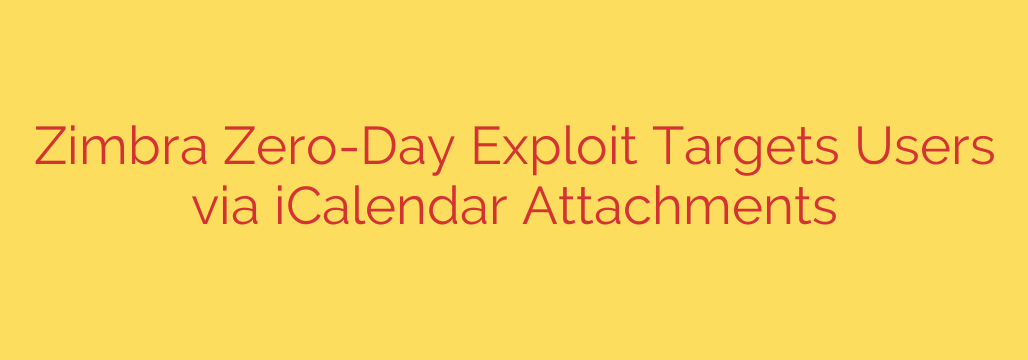
Zimbra Users Under Attack: New Zero-Day Exploit Steals Email Access
A critical zero-day vulnerability has been discovered in the Zimbra Collaboration Suite (ZCS), putting sensitive user data at immediate risk. Sophisticated attackers are actively exploiting this flaw to gain full access to email accounts without needing a password, using a cleverly disguised and highly effective method involving malicious calendar invitations.
This ongoing campaign targets a wide range of organizations, including government, media, and technology sectors, making it a significant threat for any entity relying on the popular email platform.
How the Attack Works: Malicious iCalendar Attachments
The attack leverages a persistent cross-site scripting (XSS) vulnerability within the Zimbra webmail client. Unlike typical phishing attacks that require a user to click a link or download a dangerous file, this exploit is far more subtle and dangerous.
Here is a step-by-step breakdown of the attack chain:
- The Bait: The attacker sends a carefully crafted email containing a malicious iCalendar (.ics) attachment. These are the standard files used for sharing calendar events and appointments.
- The Hidden Trap: Embedded within the calendar event’s details is a piece of malicious JavaScript code. This code is hidden in a way that is not immediately visible to the user.
- The Trigger: The vulnerability is triggered simply when a user hovers their mouse over the calendar event within the Zimbra web interface. No click is necessary, making it incredibly easy for even cautious users to fall victim.
- The Theft: Once the mouse hovers over the event, the hidden JavaScript executes in the background. Its primary goal is to steal the user’s active session cookie. This cookie acts as a temporary digital key that keeps a user logged into their account.
- The Takeover: The stolen session cookie is sent to an attacker-controlled server. With this cookie, the attacker can log into the victim’s Zimbra mailbox from their own machine, bypassing the need for a username and password entirely.
What’s at Stake? The Dangers of a Compromised Mailbox
Once an attacker gains control of a user’s session cookie, they have nearly unrestricted access to the associated email account. This can lead to severe security and privacy breaches, including:
- Complete Email Access: Attackers can read, send, forward, and delete emails at will. This includes accessing confidential business communications, financial data, and personal information.
- Data Theft and Espionage: Sensitive documents, contact lists, and calendar information can be exfiltrated for intelligence gathering or corporate espionage.
- Impersonation and Further Attacks: The compromised account can be used as a trusted source to launch additional phishing campaigns against the victim’s colleagues, clients, and partners, dramatically increasing the attack’s impact.
How to Protect Yourself: Immediate Steps for Zimbra Administrators and Users
Because this is a zero-day vulnerability, an official patch from Zimbra was not immediately available when the exploit was discovered. However, there are crucial steps that administrators and users can take to defend against this threat.
For Zimbra Administrators:
The most effective defense is to sanitize the platform’s code to prevent malicious scripts from running. While awaiting an official patch, administrators are strongly advised to manually inspect and clean incoming iCalendar attachments.
A temporary but effective mitigation involves implementing a server-side script or rule to sanitize the HTML within calendar invite components. Specifically, any malicious script tags found within the COMMENT field of an iCalendar file should be stripped out before it reaches the user’s inbox.
For End-Users:
While the primary fix lies with system administrators, individual users must remain vigilant to protect themselves.
- Be Wary of Unsolicited Invites: Treat all unexpected calendar invitations from unknown or unverified senders with extreme suspicion.
- Avoid Interaction: Do not accept, decline, or even hover over suspicious calendar events. If you receive an invite you weren’t expecting, it is safest to delete the entire email without interacting with its contents.
- Report Suspicious Activity: If you notice any unusual activity in your account or receive a strange calendar invite, report it to your IT or security department immediately.
This sophisticated attack highlights the evolving nature of cyber threats. It serves as a critical reminder that even seemingly harmless actions, like checking a calendar invite, can be exploited. Staying informed and implementing proactive security measures is the best defense against these advanced campaigns.
Source: https://securityaffairs.com/183014/hacking/zimbra-users-targeted-in-zero-day-exploit-using-icalendar-attachments.html








